- Home
- Charles de Lint
Memory and Dream Page 9
Memory and Dream Read online
Page 9
Isabelle smiled. “It just feels like the right thing to do. But please, don’t let it get around how cheap I am.”
“And you’re okay working in color?”
The guarded expression returned to her features and he berated himself for the question he’d just blurted out. But he’d been thinking of Isabelle’s curious demands concerning the originals, and then his dawn visitor’s cryptic comments. I’d suggest that you simply use monochrome studies to illustrate the book – that would certainly make it easier on Isabelle, you know.
Easier how? What was the difference between finished oils and monochrome work – beyond the obvious, of course. How did the difference between the two affect Isabelle?
“Why wouldn’t I be?” Isabelle asked.
Because someone he was fairly certain existed only in a dream had told him so. And hadn’t Cosette then added, But I have to admit I’m too selfish and lonely. It’ll be so nice to see a few new faces around here.
“I don’t know,” he said. “I just thought maybe monochrome illustrations would be –”
For no good reason, the word safer popped into his mind.
“Would be what?”
“Easier?” he tried.
“Would you prefer monochrome? Black-and-white line drawings and wash? Or perhaps sepia?”
“Well, no. It’s just that –” Think quick, he told himself. “I thought, what with your having been away from this style for so long, you might find it more comfortable to ease back into illustrative work with something simpler.”
“I’d like to provide paintings,” Isabelle said. “I think the stories require a full palette.”
“Oh, I agree.”
“And I’m just doing this one project.”
“Of course.”
The mood in the room had become rapidly strained. The tension wasn’t quite the same as it had been last night, but it still lay between them like a thickening in the air. Alan knew he had caused the sudden coolness he could feel coming from Isabelle, but he had no idea what he’d done to cause it. He just hoped that he hadn’t blown the deal for Kathy’s book. But more importantly, he hoped he hadn’t completely estranged Isabelle again. Seeing her now, being with her after all those years of separation, he couldn’t bear the thought of being shut out of her life once more.
But as suddenly as the coolness had come, Isabelle appeared to shake it off. She smiled that winning smile of hers, the one that lit her entire face and had won his heart so long ago. Casually, she started up the conversation again, steering it back onto safer ground.
Alan was happy to follow her lead, but by the time he finally left the island, he was feeling more confused than ever.
VII
Isabelle maintained her masquerade of casual good-naturedness until she’d seen Alan back to his car. Once he drove off, the mask dropped. She kicked at a pinecone that was lying on the dock and sent it flying into the water.
She was angry, but she didn’t know why.
Certainly it wasn’t Alan’s fault. He’d simply been talking about possibilities for the project, showing his concern for her having been out of touch with the illustrative field for as long as she had – not so much for the sake of the book itself, she had been able to realize, but for her own sake. For the sake of kindness.
But if it wasn’t Alan, then what was it?
Except, perhaps that same kindness that was to blame. It reminded her too much of how, after the fire, everyone had seemed to walk on eggshells around her. She’d understood – she’d appreciated – their compassion, but it had been misdirected. The loss they’d perceived had nothing to do with what had actually died in those flames. They could never have known, but it hadn’t made it any easier to deal with them.
It had proved simpler to retreat. She’d worked on the new show at the loft she’d shared with Sophie while she had the barn renovated into what was now her home and studio. Then, when the show was done, she’d left Sophie’s loft, the city, the art scene, everyone she knew – this time, she’d thought, for good. She’d known it would be easier, when someone came to visit, to deal with one small piece of her old life at a time than all of it at once, the way it would always be in Newford.
Last night’s joy at the thought of bringing Kathy’s visions to life in a new set of paintings leaked away at the thought of moving back. But she had no choice now that she’d accepted Alan’s commission. She would have to spend time in Newford, sketching and photographing locations, dealing with models, seeing too many familiar streets, meeting people she no longer knew but who would think they knew her.
It would be stepping back into the past, with all that had been left undone and unsaid and unfinished still waiting there for her; stepping back into that whole untidy tangle of memories and dreams that she had simply set aside because she couldn’t seem to find the wherewithal to deal with them.
Unable to do so then, and with nothing changed inside her, what made her think she could deal with it now? She’d found no new reservoirs of courage. She’d acquired no new abilities during her self-imposed exile.
It wasn’t anger she felt at all, she realized, except perhaps that old anger at herself and the weaknesses that drove her. It was fear.
She rowed back to the island, putting far more force than was necessary into the task. Her back ached from the fierceness she put into the effort and she had the beginning of a headache by the time she reached her dock and had moored the rowboat.
Massaging her temples, she walked slowly across the wooden planking until she stood in the forest’s shadow. There she paused. She realized that the decision she’d made last night had brought her to a demarcation of all that had gone before. She had stood in one of those rare border crossings between the past and the future, where one is aware – so aware – that the decision about to be made will change everything.
She looked back across the water to the mainland. The red of her Jeep leapt out from among the surrounding evergreens. The maples in the hills beyond carried variations on that red off into the horizon.
Alan was gone back to Newford, but she could no longer pretend she was alone. She turned back to the forest, realizing that she had to acknowledge them now.
“Which of you spoke to him?” she asked the dark spaces between the trees. There was no reply.
But she hadn’t really been expecting one. Still, she knew they were there, watching, listening.
Meddling.
As she followed the path back home, she couldn’t quite shake the feeling that this was all Rushkin’s doing. That Alan Grant hadn’t thought of her as the artist for Kathy’s book – not on his own; that she hadn’t made the decision to take on the project – not on her own.
There was no logical reason for her to see Rushkin’s hand in this, although, from the very first time she’d met him, he’d proved to be a master at manipulation. But then nothing about Rushkin had ever followed any sort of logic. Not his charismatic appeal. Not the impossible wonder he had taught her to wake from a canvas. Not the bewildering way he could shift from being arrogant to obsequious, compassionate to brutal, amiable to rude beyond compare.
And certainly there was no logic at all for why he did so many of the things he had done.
When she reached the barn, she went inside and shut the door firmly behind her. Her fingers hesitated on the interior bolt before she pulled them away. Stuffing her hands in her pockets, she slouched on a chair by the kitchen table and stared out the window. The familiar, happy view, brown-and-green fields dappled with sunshine, the bright blue beyond, had lost its ability to soothe her.
After a while she took out her letter from Kathy and reread it, turning the locker key slowly over and over in her hands as she did. Long after she’d set the letter aside, she still sat there, staring out the window again, still turning the key in her hands. Two things waited for her in Newford and she was frightened of them both. There was what was in the locker that this key would open. That was bad enough. But also waiting
for her, she knew, was Rushkin.
She’d named her studio after him, but she’d never been sure if it was out of respect for what he’d taught her or relief for having been able to escape from him. A bit of both, she supposed. It had been over ten years since he’d vanished without a word. He was dead. Everyone said so and she wanted to believe it herself. But then how many people had thought he was dead when she’d been studying under him? No, implausible though it might appear, she knew that he was still out there, somewhere, waiting for her.
If he was still alive, if he did return when she began to paint once more, utilizing what he’d taught her … what would happen to her, to her art? Would she be strong enough to resist him? She’d failed before.
What would make this time any different?
She realized that she just didn’t know, and that was what scared her most of all.
The Bohemian Girl
The way I see it, everything is science versus art.
I definitely fall on the side of art.
– Mae Moore, from an interview in Network, December 1992
Newford, December 1973
“And where do you think you’re going with that?” Rushkin demanded.
It was just after lunch, two weeks before Christmas, and Izzy was getting ready to leave the studio for a class she had that afternoon at the university. She looked up from where she’d been putting a small canvas into her knapsack to see Rushkin glaring at her. The subject of the painting in question was a still life of three old leather-bound books and a rose in a tall vase, surrounded by a scattering of pen holders and nibs. She’d finished the piece a few weeks earlier and had been waiting for it to be dry enough to take home.
“It’s a present for my roommate,” she said, not hearing the warning bells that rang faintly in the back of her mind. “For Christmas.”
“For Christmas. I see. I’d thought we had a certain set of rules concerning the work you do while you are in this studio, but I can see I was mistaken.”
A hollow feeling settled in Izzy’s stomach. She read the warning signs now, but knew she was seeing them too late.
“N-no,” she said nervously. “You’re not mistaken. I … I just forgot.” Rushkin had been adamant from the first that everything she did in the studio remained in the studio until he said otherwise. He wouldn’t explain why, and he wouldn’t allow any exceptions. “I didn’t think you’d mind.”
“No, of course you wouldn’t.” She could see the rage building up in his eyes, hear the growing vehemence in every word. “I’m merely here to provide you with a workspace and supplies so that you can shower your friends with the pitiful fruits of your labor that exist only through my largesse.”
“It’s not like that …”
“You certainly aren’t learning anything, are you?”
“But –”
He strode across the wooden floor and tugged the canvas from her hands. He held it gingerly, his severe look of distaste giving the impression that she’d rendered it in dog shit.
“My God,” he said. “Will you look at this? It gives a whole new meaning to the concept of naïve art.”
Izzy had thought it the best piece she’d done yet. It had been the first time that she really felt as though she’d managed to capture light in one of her oils: the way it fell across the various textures of her subjects, the glowing sheen and pronounced shadow on the leather of the books, the delicacy of the rose’s petals, the sparks of highlight on the pen nibs. She’d titled it By Any Name, knowing that Kathy would appreciate the literary allusion of both the title and subject.
“What could you have been thinking of?” Rushkin wanted to know.
“I … I just thought Kathy would … would like it,” she said. “She’s a … writer …”
“A writer.”
Izzy nodded.
Rushkin lowered the painting and studied her. His fierce scowl did little to ease the unhappy feeling that had grown inside her. She felt sick and dizzy and all she wanted was to be anywhere but here.
“You think me unfair, don’t you?” Rushkin said softly.
Izzy knew better than to reply.
“Did you ever stop to wonder why I would make such a rule? Did you ever think that I’m doing it for you as well as myself? Do you not think that a certain level of competency might be appreciated before you begin handing out your work to all and sundry? For the sake of my reputation, and that of my studio, if not for your own?”
“But, it’s just my friend Kathy,” Izzy protested before she realized what she was doing.
“Fine!” Rushkin roared.
He threw the painting at where she was sitting on the floor, looking up at him. A side of the small canvas caught her in the midriff. Surprise, more than the actual force of the blow, made her lose her balance and fall backward, gasping for breath.
“Take the painting!” Rushkin cried. “Take it and yourself and get out. But don’t you dare come crawling back to me. Do you understand me?”
Izzy lay where she’d fallen, arms folded over her stomach. Her body shook with an uncontrollable trembling.
“I … I didn’t mean to –” she began.
“Stop contradicting me!”
Suddenly he was standing directly over her. She tried to scrabble away from him, but her hands and feet could get no purchase on the smooth floor and he was too quick. His shoe lashed out and he caught her in the side with its hard leather toe. Pain flared, white and hot. Tears sprang in her eyes, blinding her.
“How dare you contradict me?”
Izzy curled up into a fetal position, trying to protect herself from his foot, but he kicked her again.
And again. She heard a voice crying for mercy and only recognized it as her own when the blows finally stopped.
“Oh my God,” Rushkin said. “What have I done? What have I done?”
She tried to escape his touch, but he knelt on the floor beside her and gathered her close to his chest, stroking her hair, his voice choked and filled with horror until he could speak no more and all he could do was weep.
They seemed to hold that tableau forever, but finally Rushkin’s grip loosened and Izzy managed to extricate herself from his embrace. She moved away from him, but didn’t feel strong enough to get to her feet. Her torso and legs were bruised and every movement she made hurt. It even hurt to breathe. She wanted to get up and flee, but the most she could manage was to wrap her arms around herself and stare at the pitiful figure Rushkin cut, her vision still blurry with tears.
Rushkin knelt in front of her, head bowed down to the floor. He had stopped weeping, but when he finally lifted his face, his cheeks were glistening.
“You … you should go,” he said, his gravelly voice strained with emotion. “I am a monster and I don’t deserve to be in the same room as you. God knows why you’ve put up with me.”
“Why …” Izzy began. She paused, rubbed her nose on her sleeve and cleared her throat. “Why do you … hurt me?”
Rushkin shook his head. “I wish to God I knew. I … A blind rage comes over me, as overpowering as my need to paint. Sometimes I think it’s the dark side of my muse: the side of her that craves destruction and despair.”
His gaze fixed on Izzy, but she remained silent. What he was telling her only made her feel more confused than ever.
“I know what you’re thinking,” he went on, lowering his gaze once more. “I’m making excuses, rather than taking responsibility for my brutality. But when that rage comes upon me, I am no longer in control. It is as though I have been possessed. The monster rises up and I can do nothing but weep at what it leaves in its wake.”
Rushkin lifted his head. “I’m sorry. None of what I’m saying can alleviate in any way the repugnance towards me that you must be feeling.” He rose slowly to his feet. “You should go home. Let me call you a cab – or … or do you need to go to the hospital?”
Izzy slowly shook her head. She was bruised and sore, but the last thing in the world she wanted
was to have some doctor pushing and prodding away at her. And how would she explain what had happened to her? It would be so humiliating.
She flinched as Rushkin stepped toward her, but he was only retrieving her painting. He placed it in her knapsack, then closed the fastenings.
She didn’t flinch as he approached her again, but she rose to her feet under her own steam. Rushkin didn’t offer to help her up. He merely waited for her to put on her coat, then handed her the knapsack.
“That … that painting,” she said.
“Please. Take it. It’s yours,” he said contritely. “It has a certain charm and I’m sure it will delight your friend.”
Izzy nodded. “Thanks,” she said. She hesitated, then added: “Can I ask you something personal?”
“Certainly.”
“Have you … have you thought of seeing somebody about this problem you’ve got with your temper? Like a … a therapist of some sort?”
She almost expected him to fly into another rage, but all he did was slowly shake his head.
“Look at me,” he said. “I have the appearance of a monster. Why shouldn’t I carry one inside me as well?”
Izzy did look at him and realized then that her familiarity with him had changed the way she viewed him. She didn’t see him as ugly at all anymore. He was just Rushkin.
“That doesn’t have to be true,” she said.
“If you really believe that, then I will do it.”
“You’ll get some help?”
Rushkin nodded. “Consider it a promise. And thank you, Isabelle.”
“What do you have to thank me for?”
“For showing me the charity that you have after what I’ve done to you.”
“If you really mean it,” Izzy said, “then I want to keep coming back to the studio.”
“I don’t think that would be a good idea,” Rushkin told her. “A therapist might well not be able to help me and even if I should have success, there’s no guarantee that the monster won’t arise again before the process is completed.”

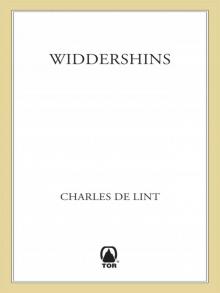 Widdershins
Widdershins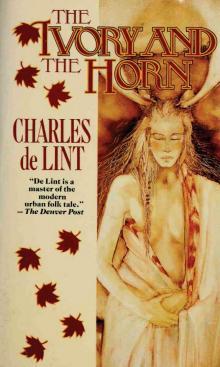 The Ivory and the Horn
The Ivory and the Horn Yarrow
Yarrow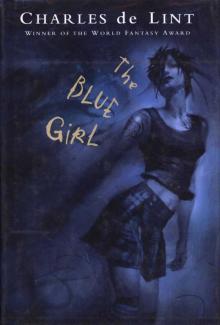 The Blue Girl
The Blue Girl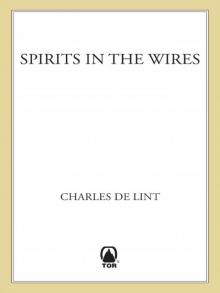 Spirits in the Wires
Spirits in the Wires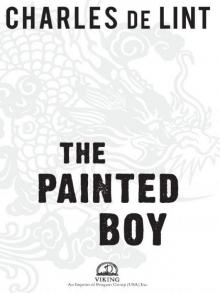 The Painted Boy
The Painted Boy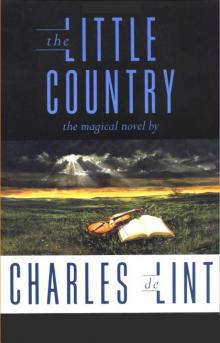 The Little Country
The Little Country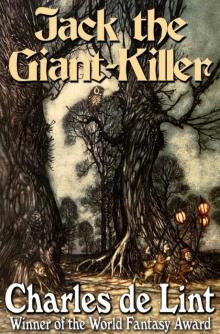 Jack of Kinrowan: Jack the Giant-Killer / Drink Down the Moon
Jack of Kinrowan: Jack the Giant-Killer / Drink Down the Moon Moonheart
Moonheart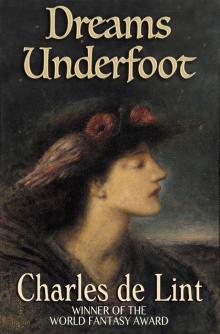 Dreams Underfoot
Dreams Underfoot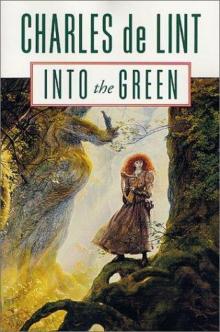 Into the Green
Into the Green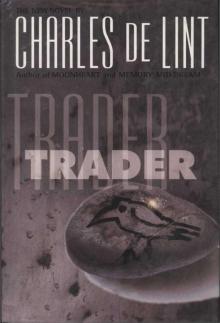 Trader
Trader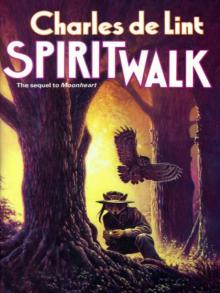 Spiritwalk
Spiritwalk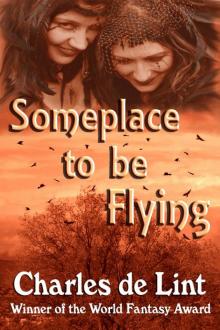 Someplace to Be Flying
Someplace to Be Flying Jack in the Green
Jack in the Green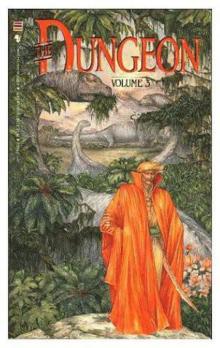 The Valley of Thunder
The Valley of Thunder Out of This World
Out of This World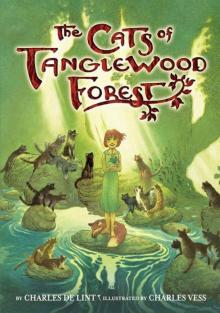 The Cats of Tanglewood Forest
The Cats of Tanglewood Forest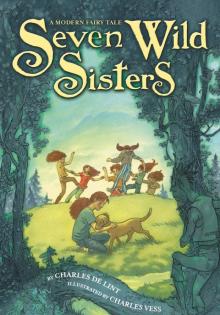 Seven Wild Sisters
Seven Wild Sisters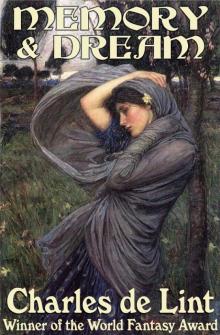 Memory and Dream
Memory and Dream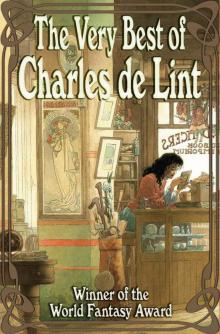 The Very Best of Charles De Lint
The Very Best of Charles De Lint Under My Skin
Under My Skin Forests of the Heart
Forests of the Heart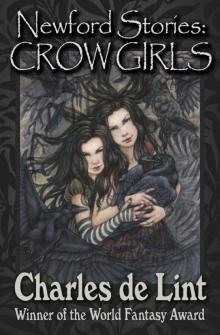 The Newford Stories
The Newford Stories Moonlight and Vines
Moonlight and Vines Angel of Darkness
Angel of Darkness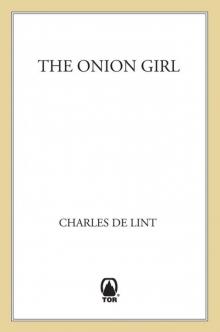 The Onion Girl
The Onion Girl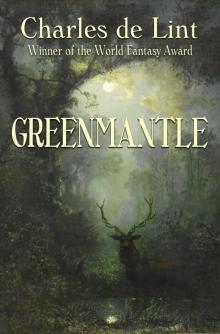 Greenmantle
Greenmantle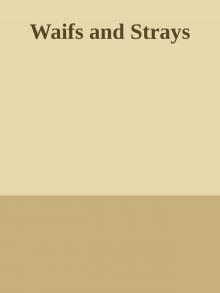 Waifs And Strays
Waifs And Strays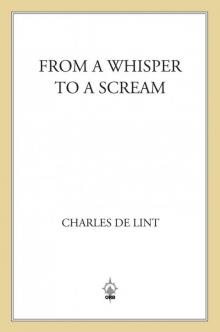 From a Whisper to a Scream
From a Whisper to a Scream Over My Head
Over My Head The Ivory and the Horn n-6
The Ivory and the Horn n-6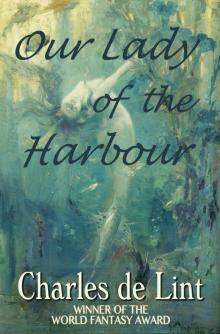 Our Lady of the Harbour
Our Lady of the Harbour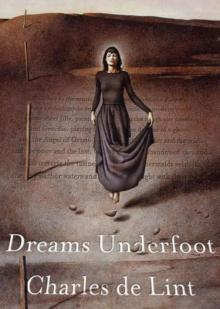 Dreams Underfoot n-1
Dreams Underfoot n-1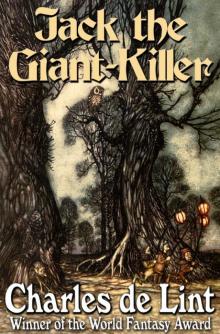 Jack the Giant-Killer (Jack of Kinrowan Book 1)
Jack the Giant-Killer (Jack of Kinrowan Book 1)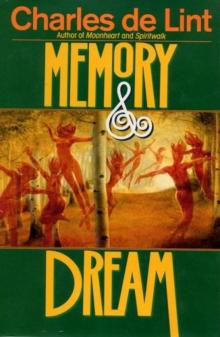 Memory and Dream n-5
Memory and Dream n-5 Under My Skin (Wildlings)
Under My Skin (Wildlings)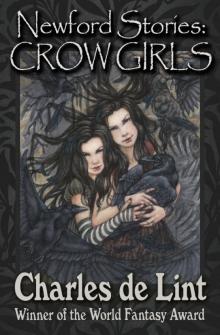 Newford Stories
Newford Stories The Wind in His Heart
The Wind in His Heart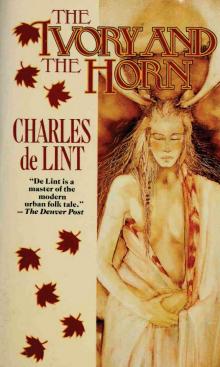 Ivory and the Horn
Ivory and the Horn